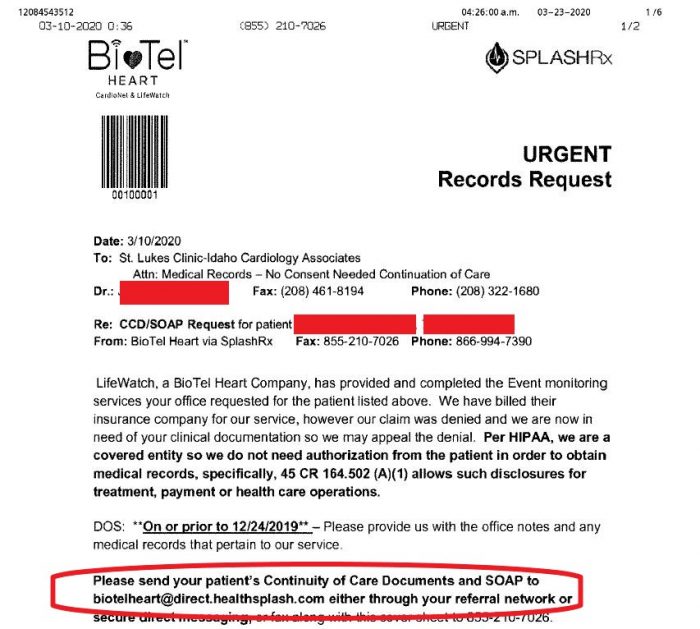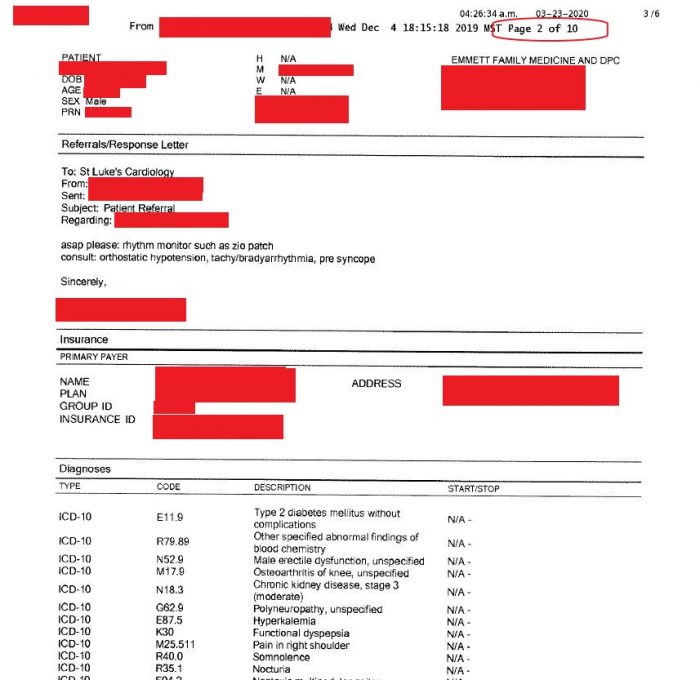On August 2, a researcher contacted DataBreaches.net about a misconfigured Amazon s3 storage bucket they had discovered. The bucket contained more than 10,000 files, recently updated, with protected health information of patients seen by or involved with BioTel Heart cardiac data network.
Sometimes it is easy to figure out the likely owner of an Amazon storage bucket. Other times, it’s difficult or just downright impossible. This one was somewhat difficult to determine ownership for, even though they all related to BioTel Heart.
The records were scanned faxes that seemed to involve BioTel Heart seeking medical records on patients that had been referred to them by providers. BioTel was requesting the patients’ records because their claims for insurance reimbursement had been denied and they needed more records to support their appeal of denied benefits.
The communications and faxes appeared to be handled by SplashRx/HealthSplash, and providers were instructed to provide the requested records to BioTel via HealthSplash.com.

In response to such requests, the providers generally provided lengthy medical records on their patients — in many cases, more than 10 pages long.

Looking at the file dates in the bucket, the data may have been online since May, 2019, although that does not prove that it was unsecured for all that time (although it would not be unlikely to find that it had been unsecured the whole time).
BioTel Heart and SplashRx/HealthSplash clearly have some relationship, but whose bucket was it? Was it one of them or some third party? Neither the researcher nor I could tell for sure, so on August 3, I sent emails to SplashRx and then subsequently used the contact form for BioTel to alert them too.
Getting no response from either party, DataBreaches.net sent emails again to SplashRx/HealthSplash and BioTel Heart to alert them to the leak and to ask them some questions about it.
Still no response.
On Saturday, August 8, the researcher contacted Amazon’s abuse team to report the situation and to ask them to contact their customer to lock the data down. By Sunday morning, it was locked down, but of course, Amazon doesn’t reveal who their customer is so we still did not know who was responsible for the leaky bucket.
Further attempts to get answers from BioTel and SplashRx were equally unsuccessful.
This was a leak that involved a lot of sensitive health information.
The providers and patients come from all over the country. The doctors who referred their patients to BioTel Heart or who sent the requested medical records to help BioTel get paid by insurers likely have no idea that all of their patients’ records were exposed in scanned pdf files. Medical practices who cooperatively faxed over multi-page detailed medical records to BioTel via SplashRx might be horrified to learn that their patient’s detailed records were exposed that way.
And I think we can safely bet that the patients have no idea that their medical records were exposed this way, and would not be happy to find out.
But will this leak be reported to HHS or state regulators or patients?
DataBreaches.net does not know, but will be following up. And if DataBreaches.net receives a response from either of the entities, this post may be updated.
Correction: On April 7, after reviewing the storage bucket, DataBreaches.net edited this post to remove any claim that there were 60,000 patient records. That appeared to be an error in our original calculations, and we apologize for the error.